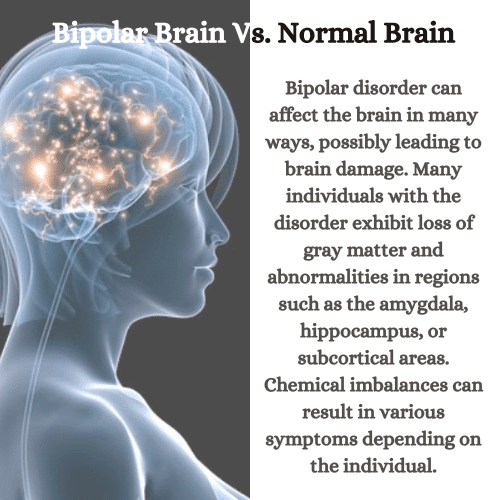Bipolar disorder is an intricate mental health condition that impacts millions of individuals globally. But have you ever wondered how bipolar disorder affects the brain? How does Bipolar disorder affect daily life?
In this blog, we will delve into the intricate ways in which bipolar disorder can affect daily life, specifically addressing how bipolar disorder affects the brain. This exploration aims to shed light on both the emotional toll on individuals and the physiological impact on the brain.
Studies indicate that individuals with bipolar disorder frequently exhibit imbalances in specific brain chemicals, including serotonin, dopamine, and norepinephrine. These imbalances can have a profound effect on mood regulation and emotional stability, resulting in the characteristic highs and lows of bipolar disorder.
Is bipolar disorder affecting your daily life?
Additionally, research has uncovered abnormalities in the structure and functioning of brain regions associated with emotional processing, memory, and decision-making. These alterations may contribute to the erratic behavior and cognitive impairments commonly associated with the disorder. Understanding how bipolar disorder affects the brain is crucial for developing effective treatments and interventions.
Through unraveling the intricate mechanisms, researchers aspire to formulate targeted therapies that address the underlying neurological abnormalities. Join us as we explore the complex connection between bipolar disorder and the brain, gaining insight into the profound impact this condition has on one’s mental and emotional well-being. How does bipolar disorder’s effect on the brain influence your understanding of its impact on daily life?

Understanding Bipolar Disorder: A Brief Overview
Marked by intense mood swings oscillating between manic highs and depressive lows, bipolar disorder profoundly impacts how individuals experience and navigate their daily lives. Although the precise causes of bipolar disorder are intricate and multifaceted, it is evident that the development of the condition involves critical roles played by both genetic and environmental factors.
Impact on Daily Routine: Rollercoaster of Emotions
Manic Episodes:
- Elevated Energy: During manic episodes, individuals may experience heightened energy levels, increased impulsivity, and a reduced need for sleep. This can lead to erratic decision-making and impulsive actions that disrupt daily routines.
- Intense Focus: While increased focus can be a positive aspect, it may also result in obsessive behaviors or fixation on specific tasks, causing neglect of other essential elements of daily life.
Depressive Episodes:
- Lethargy and Fatigue: Depressive episodes often bring overwhelming fatigue, making even simple daily tasks seem like insurmountable challenges.
- Loss of Interest: Individuals may lose interest in activities they once enjoyed, affecting work, relationships, and overall quality of life.
Impact on Relationships: Navigating the Storm
Bipolar disorder can strain relationships due to the unpredictability of mood swings. Communication challenges, emotional withdrawal, and misunderstandings may impact both personal and professional connections.
Understanding the brain and its functions
The human brain is a marvel of nature, a complex organ that is the epicenter of our thoughts, emotions, and actions. Understanding the brain and its functions is a fascinating journey that unveils the secrets behind our cognitive abilities and the intricacies of our nervous system.
Key Components:
Fundamentally, the brain consists of billions of neurons, specialized cells transmitting information through electrical and chemical signals. These neurons form intricate networks, creating a vast communication system within the brain. The brain is compartmentalized into different regions, each accountable for distinct functions such as motor skills, sensory perception, and higher cognitive processes.
Functions of the Brain:
- Cognitive Processing: The brain serves as the central command center for cognitive functions like thinking, reasoning, and problem-solving. It processes information received from the senses, enabling us to comprehend and navigate the world around us.
- Emotional Regulation: In the depths of the brain, structures such as the amygdala and hippocampus play pivotal roles in processing emotions and forming memories. Understanding these mechanisms provides insights into emotional regulation and mental well-being.
- Motor Control: The brain is the command center for our movements, coordinating complex interactions between muscles and nerves. This enables us to perform a myriad of activities, from simple tasks to intricate actions.
- Sensory Perception: Various regions of the brain interpret signals from our senses, allowing us to see, hear, touch, taste, and smell. This intricate process helps us experience and interact with our environment.
Challenges and Discoveries:
While much has been unraveled about the brain, there is still a vast realm of mysteries waiting to be explored. Researchers and scientists continually strive to understand the complexities of neurological disorders, brain injuries, and the impact of external factors on brain function.
How Bipolar Disorder Affects the Brain: The Neurological Landscape
Bipolar disorder is a mental health condition characterized by extreme mood swings, ranging from manic highs to depressive lows. Beyond its emotional toll, bipolar disorder significantly influences the neurological landscape of the brain. Exploring the intricate ways in which this disorder affects the brain provides valuable insights into its underlying mechanisms.
Neurochemical Imbalance:
- Disruptions in neurotransmitters (dopamine, serotonin, norepinephrine) contribute to mood fluctuations.
- Imbalances play a pivotal role in the manic and depressive episodes experienced by individuals with bipolar disorder.
Structural Changes:
- Bipolar disorder may lead to alterations in the size and activity of specific brain regions.
- Changes are observed in areas linked to mood regulation and emotional processing.
Impact on Neural Circuits:
- Dysregulation in neural circuits responsible for emotion regulation contributes to the intensity and duration of mood episodes.
- Understanding these disruptions is essential for developing targeted interventions and treatment strategies.
Stress Response and the HPA Axis:
- Abnormalities in the hypothalamic-pituitary-adrenal (HPA) axis are associated with bipolar disorder.
- Dysregulation increases sensitivity to stress, potentially contributing to mood episode onset and exacerbation.
Neuroplasticity and Cognitive Function:
- Bipolar disorder impacts the brain’s neuroplasticity, affecting its ability to adapt and reorganize.
- Cognitive functions, including memory, attention, and decision-making, may face compromise.
The neurological landscape of bipolar disorder is complex, involving neurotransmitter imbalances, structural changes, and disruptions in neural circuits. Ongoing research offers hope for the development of more effective treatments targeting the specific mechanisms underlying this challenging condition.
How does Bipolar disorder affect daily life?
Characterized by extreme mood swings, bipolar disorder is a mental health condition. It affects various aspects of an individual’s daily life. It is essential to comprehend these effects to offer assistance and address the challenges associated with the disorder effectively.
Emotional Rollercoaster:
- Manic Episodes: During manic phases, individuals may experience heightened energy, impulsivity, and decreased need for sleep. This can lead to risky behaviors and strained relationships.
- Depressive Episodes: Depressive phases bring intense sadness, fatigue, and feelings of hopelessness, making it challenging to engage in daily activities.
Disrupted Sleep Patterns:
- Bipolar disorder often disrupts sleep, with individuals experiencing insomnia during manic episodes and hypersomnia during depressive episodes.
- Irregular sleep patterns contribute to fatigue, impacting concentration and overall functioning.
Impaired Concentration and Decision-Making:
- Cognitive impairment is common, affecting concentration, memory, and the ability to make sound decisions.
- This can hinder performance at work or school, leading to challenges in meeting responsibilities.
Interpersonal Challenges:
- Rapid mood swings and unpredictable behavior strain relationships with family, friends, and colleagues.
- Maintaining stable, healthy connections becomes challenging, affecting both personal and professional life.
Employment Issues:
- Bipolar disorder can result in absenteeism, reduced productivity, and difficulty maintaining employment.
- During mood episodes, individuals may find it challenging to cope with the demands of a job.
Financial Strain:
- Impulsive spending during manic episodes can lead to financial difficulties.
- The instability in employment and income exacerbates financial challenges, adding stress to daily life.
Medication Management:
- Adhering to medication regimens is essential in effectively managing bipolar disorder; however, fluctuations in mood and side effects may influence compliance.
- Establishing a consistent medication routine can be a daily challenge.
Impact on Self-Esteem:
- The cyclical nature of bipolar disorder and the associated challenges may contribute to feelings of guilt, shame, and low self-esteem.
- Managing these emotional aspects is an ongoing aspect of daily life.
Lifestyle Disruptions:
- Maintaining a consistent daily routine is challenging due to the unpredictable nature of mood swings.
- Healthy habits, such as regular exercise and a balanced diet, may be difficult to sustain.
Treatment and Therapy Commitments:
- Regular therapy sessions and medical appointments are essential components of managing bipolar disorder.
- Balancing these commitments with daily responsibilities can be a logistical challenge.
Understanding the multifaceted impact of bipolar disorder on daily life underscores the importance of a comprehensive approach to treatment, including medication, therapy, and a supportive social network. The comprehensive strategy seeks to improve the quality of life for individuals diagnosed with bipolar disorder.
Tired of fighting addiction and mental health struggles?
Ignoring both deepens the struggle. Our holistic approach—detox, therapy, and medication-assisted treatment—can help you heal. Take the first step today.
Seeking Balance: Managing Bipolar Disorder in Daily Life
While bipolar disorder poses challenges, effective management is possible with a comprehensive approach:
- Medication:
Psychiatric medications, including mood stabilizers and antipsychotics, can help regulate mood swings.
- Therapy:
Psychotherapy, such as Cognitive-Behavioral Therapy (CBT) and Interpersonal and Social Rhythm Therapy (IPSRT), provides coping strategies and emotional regulation tools.
- Lifestyle Adjustments:
Overall stability is promoted through maintaining consistent sleep patterns, engaging in regular exercise, and effectively managing stress.
- Support System:
Building a strong support system of friends and family helps individuals navigate the challenges of bipolar disorder.
The Bottom Line:
Living with bipolar disorder means facing a mix of highs and lows that can make each day different. It’s not just about moods; it’s like a puzzle that affects both the mind and daily routines.
Imagine feeling super energetic and excited one day (that’s the high), but then suddenly feeling down and drained the next (that’s the low). This emotional rollercoaster can make it tough to do regular things like going to work or spending time with friends.
Not just that, the way bipolar disorder works in the brain adds another layer to the puzzle. It’s like a switch that turns emotions up and down. Sometimes, it’s hard to concentrate, make decisions, or even get a good night’s sleep. It’s like trying to keep everything in balance while the ground keeps shifting.
Relationships can be tricky too. Friends and family might find it hard to understand these mood swings, leading to ups and downs in relationships. Holding down a job and managing money can be a challenge too, especially when the disorder affects how you think and plan.
Taking medication is part of the routine for many with bipolar disorder, and keeping up with therapy sessions is crucial. But here’s the thing – it’s not just about managing the mind; it’s also about figuring out how to handle daily life when the mind is playing its own game.
So, how does bipolar disorder affect daily life, and what’s happening in the brain that makes it such a puzzle? It’s like searching for answers to understand this unique challenge. Yet, in the search for understanding, perhaps we can find ways to make each day a little more manageable and bring a bit more stability to the mix. How do you think we can better support those dealing with bipolar disorder in their daily lives? Share your thoughts in the comments.











